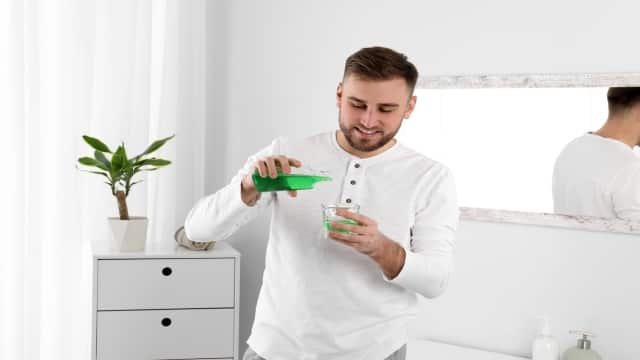What Do Chlorhexidine Gluconate Mouthwashes Treat?
Chlorhexidine gluconate is used to treat gingivitis, another name for mild gum disease. Symptoms can include bad breath and gum redness, swelling and bleeding. While brushing your teeth and gums twice per day and flossing once per day can help prevent gingivitis, a prescription mouthwash may help reduce the symptoms when you're already in the early stages. However, according to the Mayo Clinic , you shouldn't look to chlorhexidine gluconate mouthwash to fully treat periodontitis, a more advanced form of gum disease. It may be used as an adjunct to other periodontitis treatments.
How Does It Work?
When you rinse with chlorhexidine gluconate mouthwash, the active ingredient chlorhexidine works to destroy harmful mouth bacteria, even after you spit.
Are There Any Side Effects?
Chlorhexidine gluconate mouthwash has a few possible side effects, like a change in taste, an increase in tartar build-up, and staining of the teeth, gums, and dental appliances. Not to worry, though. These side effects are usually very minor.
While severe side effects of using medicated mouthwash are rare, some people can experience swollen neck glands and irritation in the mouth and tip of the tongue. Notify your dentist immediately if you experience any of these symptoms, or you believe you might be experiencing an allergic reaction to the mouthwash.
Is It Safe?
Only use chlorhexidine gluconate mouthwash if your physician or dentist prescribes it. Under the guidance of a healthcare professional, the product is safe when used as directed. According to C. S. Mott Children's Hospital, medicated mouthwash is not meant for anyone under the age of 18 without your physician's clinical judgement, so make sure to keep it out of reach from young children.
Though chlorhexidine gluconate mouthwash is effective at killing mouth bacteria in mild cases of gum disease, it's not a substitute for regular brushing and flossing for total oral health. Along with daily flossing, try brushing with a toothbrush that has curved, soft outer bristles to clean the gumline and firmer inner bristles to effectively clean teeth.
If you are ready to take steps towards gum health, chlorhexidine gluconate oral rinse could be helpful in improving your oral care routine. Talk to your dentist about your options, and they will be able to help you find the solution that fits your smile best.
This article is intended to promote understanding of and knowledge about general oral health topics. It is not intended to be a substitute for professional advice, diagnosis or treatment. Always seek the advice of your dentist or other qualified healthcare provider with any questions you may have regarding a medical condition or treatment.
ORAL HEALTH QUIZ
What's behind your smile?
Take our Oral Health assessment to get the most from your oral care routine
ORAL HEALTH QUIZ
What's behind your smile?
Take our Oral Health assessment to get the most from your oral care routine















